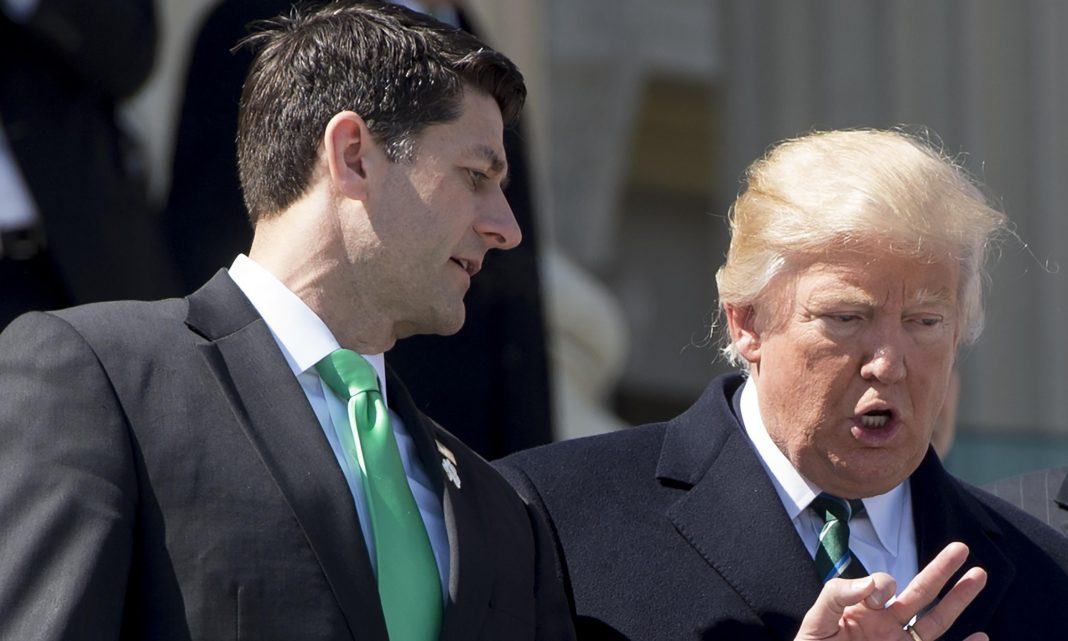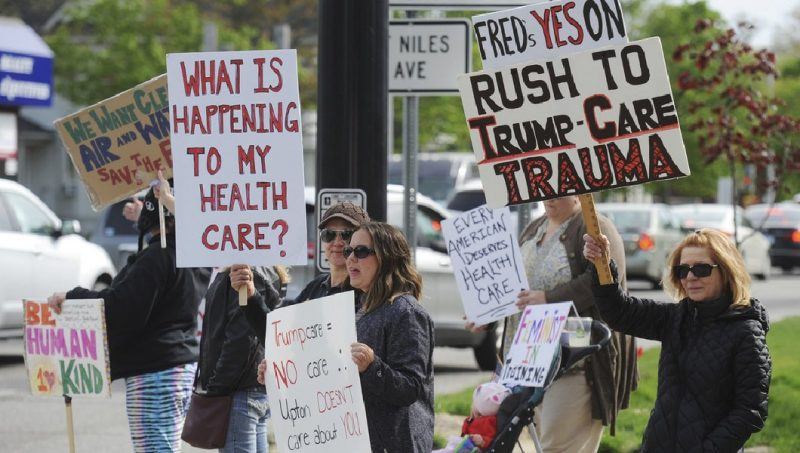
If you were hoping that Obamacare, or at least the best of the American Care Act (ACA), would stay in place, you don’t have a reason to panic right now. Yes, the Republicans in Congress pass their third and latest attempt to repeal and replace Obamacare, but it now has to go to the Senate where it will likely whither on the vine.
Just because it passed in the house doesn’t mean that Obamacare is over. If you’re happy with your insurance right now, it’s safe while the bill gets kicked around in the Senate.
It was a tight vote of 217-213 on Thursday. President Donald Trump had a real nail biter, but he was very vocal that he wanted/needed a big win to celebrate in the Rose Garden which he promptly did after learning the results.
There were 20 Republican representatives who voted against the act, and hopefully, the voters in their districts will remember this next year when they’re campaigning.
The Republican push to replace the Affordable Care Act was revived this week in Congress by a small change to their plan designed to combat concerns over coverage for those with pre-existing health problems.
The change helped get the bill through the House of Representatives in a tight vote Thursday, but experts say it may make little difference in the hunt for affordable coverage for these patients.
The bill proposes setting aside an additional $8 billion over five years to help states cover those who may be subject to higher insurance rates because they’ve had a lapse in coverage. That’s on top of about $100 billion over a decade for states to help people afford coverage and stabilize insurance markets.
The problem, experts say, is that the money is unlikely to guarantee an affordable alternative for those who get coverage under a popular provision of the Affordable Care Act that prevents insurers from rejecting people or charging higher rates based on their health.
“Many people with pre-existing conditions will have a hard time maintaining coverage because it just won’t be affordable,” said Larry Levitt, a health insurance expert with the Kaiser Family Foundation, which studies health care issues.
The ultimate impact on those with pre-existing conditions remains unknown. The bill now heads for the Senate, where it is expected to change, and the plan leaves many important coverage decisions up to the states. Still, it is making some who are now covered by the Affordable Care Act nervous.
John S. Williams, an attorney in New Orleans whose multiple sclerosis medication costs $70,000 a year, buys insurance through the Affordable Care Act’s marketplace. Without protections for pre-existing conditions he fears he would have to close his law practice and find a job with that offers a group insurance plan.
“We always hear about job growth and business creation – being able to have affordable health care drives that,” Williams said. “I have tremendous satisfaction with owning a business, but I know that if I can’t get coverage, I would be forced to get a different job. I can’t not have coverage for my multiple sclerosis.”
Here’s how coverage may change for those with pre-existing conditions under the plan:
WHAT CHANGES?
States will be able to get federal waivers allowing insurers to charge higher premiums to people with pre-existing illnesses who have let their coverage lapse. States can then use federal money to fund government-operated insurance programs for expensive patients called “high-risk pools.”
HOW DO THESE POOLS OPERATE?
Patients who couldn’t get or afford insurance could apply for coverage through these high risk pools, which existed before the Affordable Care Act was passed. Even though they were charged far higher rates, up to double the amount paid by consumers with no serious ailments, care for these patients is so expensive that government money was needed to fund the programs.
DO THEY WORK?
In the more than 30 states that had high-risk pools, net losses piled up to more than $1.2 billion in 2011, the high point of the pools before the Affordable Care Act took full effect. Medical expenses outpaced premiums collected, and losses averaged $5,500 per person enrolled. States used fees and taxes to make up the difference, and states sometimes made it more difficult to some to qualify for care.
IS THE FEDERAL MONEY ENOUGH?
An analysis by the health care consulting firm Avalere found that the money would only be enough to fund high-risk pools in a few small states. High-risk pools could fill up fast with patients who have a lapse in coverage.
People with pre-existing conditions could lose their insurance if they can no longer work due to their health. The Republican health plan also is expected to raise premiums for older people, who are more likely to have a pre-existing condition.
“This gets complicated fast,” Avalere President Dan Mendelson said.
About 2.2 million people in the individual insurance market have some sort of pre-existing chronic condition, according to Avalere.
WHAT MIGHT THIS MEAN FOR PATIENTS?
Because the bill is expected to change, and because it leaves big decisions up to the states, it’s hard to say now what it would mean. Also, federal auditors have not had time to analyze the plan.
Proponents of the bill note that people in poor health would still be protected as long as they maintain coverage. If they don’t, the higher premiums they are charged would revert back to standard rates after 12 months, assuming the customer could afford to keep paying.
In the past, risk pools have not guaranteed coverage. States have established waiting lists to get into their risk pools or restricted admission to the pools, since they ultimately have to balance their budget and they have no way to predict how high costs will climb.
“There is no guarantee in the law that people with pre-existing conditions would get access to affordable coverage,” said Kaiser’s Levitt.
Adrienne Standley, the operations director at a start-up apparel business in Philadelphia, is not waiting to find out. Her plan through the Affordable Care Act covers treatment for her asthma and attention deficit disorder, but she’s afraid the Republican plan will mean she can no longer afford doctor’s visits and medication.
“I’m looking at stockpiling, making sure I have an inhaler,” she said. “I’m pretty scared to lose coverage.”
So just who did vote for this latest version? Here’s the list broken down by state and district for you voters wanting to make a decision early for their re-election campaign.
AL-1 Bradley Byrne
AL-2 Martha Roby
AL-3 Mike D. Rogers
AL-4 Robert B. Aderholt
AL-5 Mo Brooks
AL-6 Gary Palmer
AR-2 French Hill
AR-3 Steve Womack
AR-4 Bruce Westerman
AZ-2 Martha E. McSally
AZ-4 Paul Gosar
AZ-6 David Schweikert
AZ-8 Trent Franks
CA-4 Tom McClintock
CA-22 Devin Nunes
CA-23 Kevin McCarthy
CA-45 Mimi Walters
CA-48 Dana Rohrabacher
CA-50 Duncan Hunter
CO-4 Ken Buck
FL-1 Matt Gaetz
FL-3 Ted Yoho
FL-4 John Rutherford
FL-11 Daniel Webster
FL-12 Gus Bilirakis
FL-15 Dennis A. Ross
FL-16 Vern Buchanan
FL-17 Tom Rooney
FL-18 Brian Mast
FL-19 Francis Rooney
GA-1 Earl L. “Buddy” Carter
GA-3Drew Ferguson
GA-7Rob Woodall
GA-9Doug Collins
GA-10Jody B. Hice
GA-11Barry Loudermilk
GA-12Rick W. Allen
GA-14Tom Graves
IA-4Steve King
IL-13Rodney Davis
IL-15John Shimkus
IL-18Darin M. LaHood
IN-2Jackie Walorski
IN-3Jim Banks
IN-4Todd Rokita
IN-6Luke Messer
IN-8Larry Bucshon
KS-1Roger Marshall
KS-2Lynn Jenkins
KS-4Ron Estes
KY-1James Comer
KY-2Brett Guthrie
KY-6Andy Barr
LA-1Steve Scalise
LA-3Clay Higgins
LA-5Ralph Abraham
MD-1Andy Harris
MI-1Jack Bergman
MI-2Bill Huizenga
MI-4John Moolenaar
MI-6Fred Upton
MI-7Tim Walberg
MI-8Mike Bishop
MI-10Paul Mitchell
MI-11Dave Trott
MN-2Jason Lewis
MO-2Ann Wagner
MO-3Blaine Luetkemeyer
MO-4Vicky Hartzler
MO-6Sam Graves
MO-7Billy Long
MO-8Jason Smith
MS-3Gregg Harper
MS-4Steven M. Palazzo
NC-2George Holding
NC-5Virginia Foxx
NC-6Mark Walker
NC-7David Rouzer
NC-8Richard Hudson
NC-9Robert Pittenger
NC-10Patrick T. McHenry
NC-11Mark Meadows
NC-13Ted Budd
ND-1Kevin Cramer
NE-2Don Bacon
NE-3Adrian Smith
NJ-3Tom MacArthur
NV-2Mark Amodei
NY-1Lee Zeldin
NY-2Peter T. King
NY-19John J. Faso
NY-21Elise Stefanik
NY-23Tom Reed
NY-27Chris Collins
OH-1Steve Chabot
OH-4Jim Jordan
OH-5Bob Latta
OH-6Bill Johnson
OH-8Warren Davidson
OH-12Pat Tiberi
OH-15Steve Stivers
OH-16James B. Renacci
OK-1Jim Bridenstine
OK-2Markwayne Mullin
OK-3Frank D. Lucas
OK-4Tom Cole
OK-5Steve Russell
OR-2Greg Walden
PA-3Mike Kelly
PA-4Scott Perry
PA-5Glenn Thompson
PA-9Bill Shuster
PA-10Tom Marino
PA-11Lou Barletta
PA-16Lloyd K. Smucker
PA-18Tim Murphy
SC-1Mark Sanford
SC-2Joe Wilson
SC-4Trey Gowdy
SC-7Tom Rice
SD-1Kristi Noem
TN-1Phil Roe
TN-2John J. Duncan Jr.
TN-3Chuck Fleischmann
TN-4Scott DesJarlais
TN-6Diane Black
TN-7Marsha Blackburn
TN-8David Kustoff
TX-1Louie Gohmert
TX-2Ted Poe
TX-3Sam Johnson
TX-4John Ratcliffe
TX-5Jeb Hensarling
TX-6Joe L. Barton
TX-7John Culberson
TX-8Kevin Brady
TX-10Michael McCaul
TX-11K. Michael Conaway
TX-12Kay Granger
TX-13Mac Thornberry
TX-14Randy Weber
TX-17Bill Flores
TX-19Jodey Arrington
TX-21Lamar Smith
TX-22Pete Olson
TX-24Kenny Marchant
TX-25Roger Williams
TX-26Michael C. Burgess
TX-27Blake Farenthold
TX-31John Carter
TX-32Pete Sessions
TX-36Brian Babin
UT-1Rob Bishop
UT-2Chris Stewart
UT-3Jason Chaffetz
UT-4Mia Love
VA-1Rob Wittman
VA-2Scott Taylor
VA-5Tom Garrett
VA-6Robert W. Goodlatte
VA-7Dave Brat
VA-9Morgan Griffith
WA-4Dan Newhouse
WA-5Cathy McMorris Rodgers
WI-1Paul D. Ryan
WI-5Jim Sensenbrenner
WI-6Glenn Grothman
WI-7Sean P. Duffy
WY-1Liz Cheney


